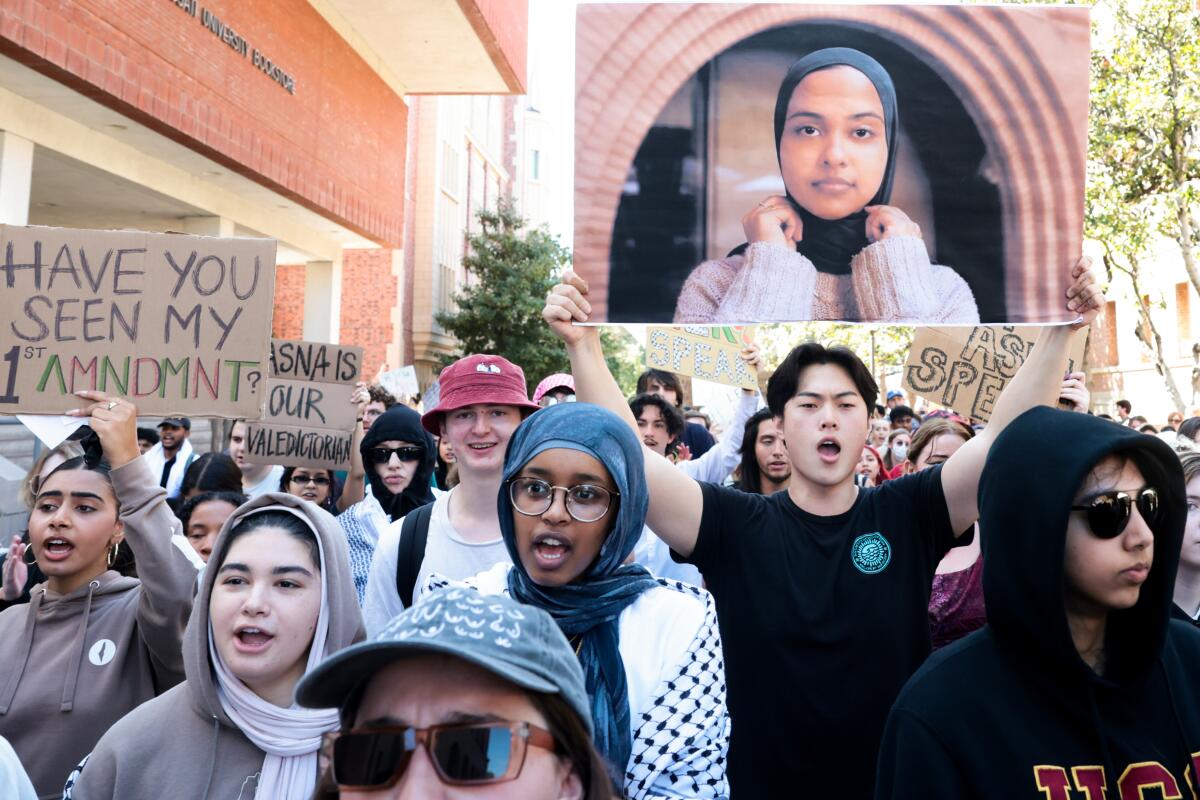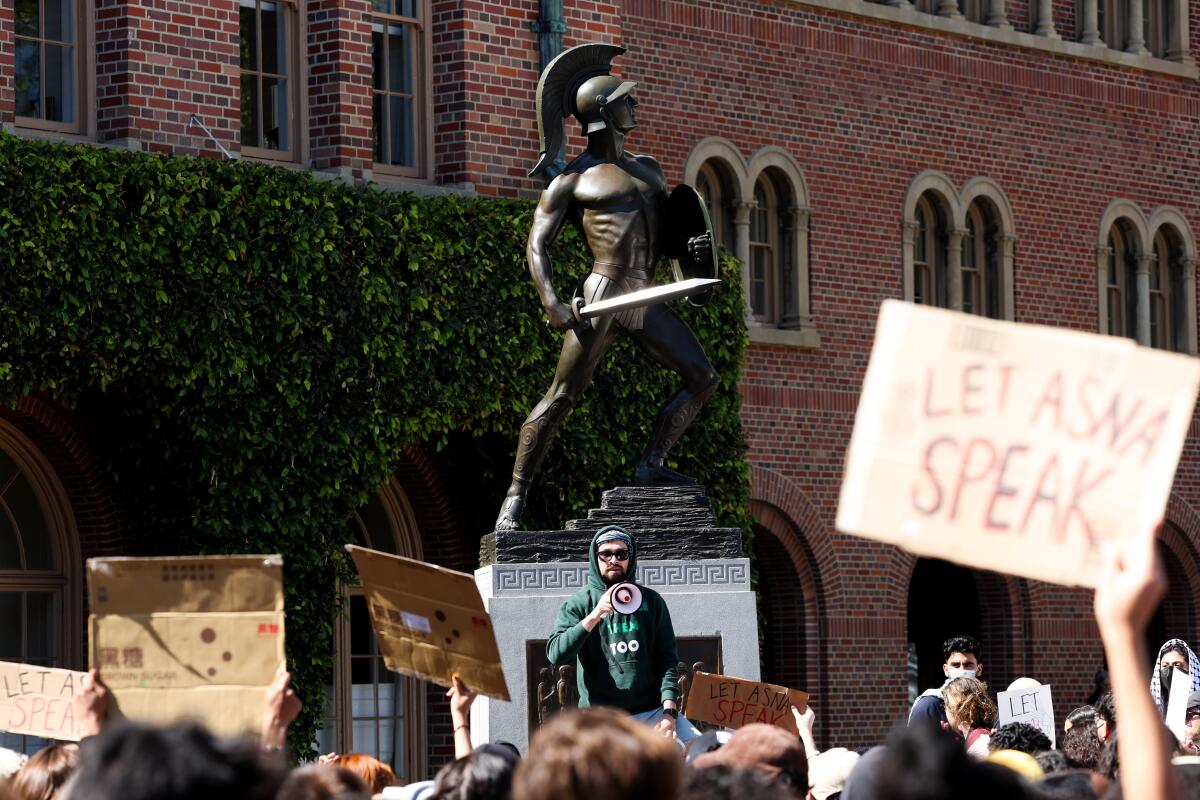USC students, faculty and pro-Palestinian protesters responded to a call to action Thursday to fight back against what they say is the “institutional silencing” of valedictorian Asna Tabassum.
“Let her speak! Let her speak!” the crowd of hundreds chanted, a few holding up signs bearing Tabassum’s face.
USC is barring the valedictorian from speaking at its May 10 commencement — a first in the university’s 143-year history — over unspecified safety threats, Provost Andrew T. Guzman announced in a campus-wide letter Tuesday.
The move came after pro-Israel groups criticized Tabassum for a link on her Instagram profile directing people to a pro-Palestinian website.
Groups on and off campus say the site is evidence that the graduating senior is antisemitic, which Tabassum denied in an interview with The Times.
“It’s no longer about free speech. It’s no longer about me. It is about when the university silences me, they are silencing all these people,” Tabassum said, referring to pro-Palestinian activists.
On Thursday, students and faculty initially walked silently in the heat while media choppers hovered overhead. Many wore head coverings, including beanies, hoodies, hijabs and keffiyehs, and some had tape over their mouths to represent what they call Tabassum’s unjust silencing.
Students, faculty and pro-Palestinian activists from off campus joined Thursday’s largely silent march at USC.
(Wally Skalij / Los Angeles Times)
“This campus has been hostile to Muslim voices, Palestinian voices, people who are calling out the genocide happening,” said Maideh Orangi, a USC senior who attended the protest in support of Tabassum. “This is just another example of that.”
Orangi, co-chair of the school’s Middle Eastern North African Student Assembly, said there had been tensions on campus since the Oct. 7 attack in Israel, including when an economics professor was temporarily banned from the university grounds after being seen on video calling for the killing of members of Hamas.
“In recent months, it’s become more tame and mellow on campus, because that’s just how things settle after a while,” said Orangi, who noted she was speaking only for herself, and not for her student organization. “But this has brought it all back to a peak.”
Orangi, an Iranian American and hijab-wearing Muslim, said that the attacks and “silencing” of Tabassum felt “bigger than one student.”
The protest, planned as a “silent march,” was calm and orderly. Students and faculty talked softly among themselves as they followed those ahead of them down campus paths.
“This is nothing compared to the disruption we’re going to see at commencement,” one student said.
“She worked so hard for the honor of speaking,” said another.
USC public safety officers in uniform followed the crowd on bikes but did not intervene. Although some protesters held signs in support of Tabassum, no chants rose from the crowd until near the end of the protest.

Protesters chanted, “Let her speak!” after initially marching silently in support of valedictorian Asna Tabassum, some carrying her image.
(Wally Skalij / Los Angeles Times)
The crowd came to a stop near Allyson Felix Field and broke the silence with calls of, “Let her speak!”
Prior to the on-campus demonstration, Sabrina Jahan, a pro-Israel Jewish student involved in the Chabad Jewish Center at USC, said she would avoid the area near Thursday’s protest.
“I don’t see me showing up to this silent protest as something that will be productive for either side,” Jahan said.
The 22-year-old business administration major from Los Angeles said she saw those demonstrating as fighting for the wrong cause.
Jahan said that her own position on Tabassum has “nothing to do with her religious beliefs and nothing to do with her academic achievement” — but that she feels the views the valedictorian linked to on social media are “clearly antisemitic.”
Saying the protest “represents a double standard,” she asked: “If a valedictorian was selected who was discriminatory and promotes hate speech against any other racial minority, would we have allowed them to be chosen for this position or speak? No.”
The university had “made the wrong choice in the valedictorian and in how to handle the controversy,” she added.

The protest on USC’s campus Thursday had some students avoiding the area altogether.
(Wally Skalij / Los Angeles Times)
Jahan described a climate in which some Jewish students, like herself, feel “villainized as a threat.” USC’s lack of transparency surrounding security threats, she said, had caused others to “think it is Jewish people who are making them.”
“USC solely cited security — very vaguely — as why she will not speak. By doing so they put both Jewish and Muslim communities in a much worse and dangerous position on campus,” Jahan said.
Sarah Schornstein, a Jewish graduate student who was on campus Thursday, said she was also avoiding the protest — but not because she completely disagreed with it.
“I’m a free speech absolutist,” said Schornstein, who studies public diplomacy. “I’m just not big on protests.”
“I agree that she linked to things that were clearly antisemitic — a page calling for the dissolution of Israel,” she said of Tabassum. “But ultimately, we don’t know what she was going to say” at graduation.




















